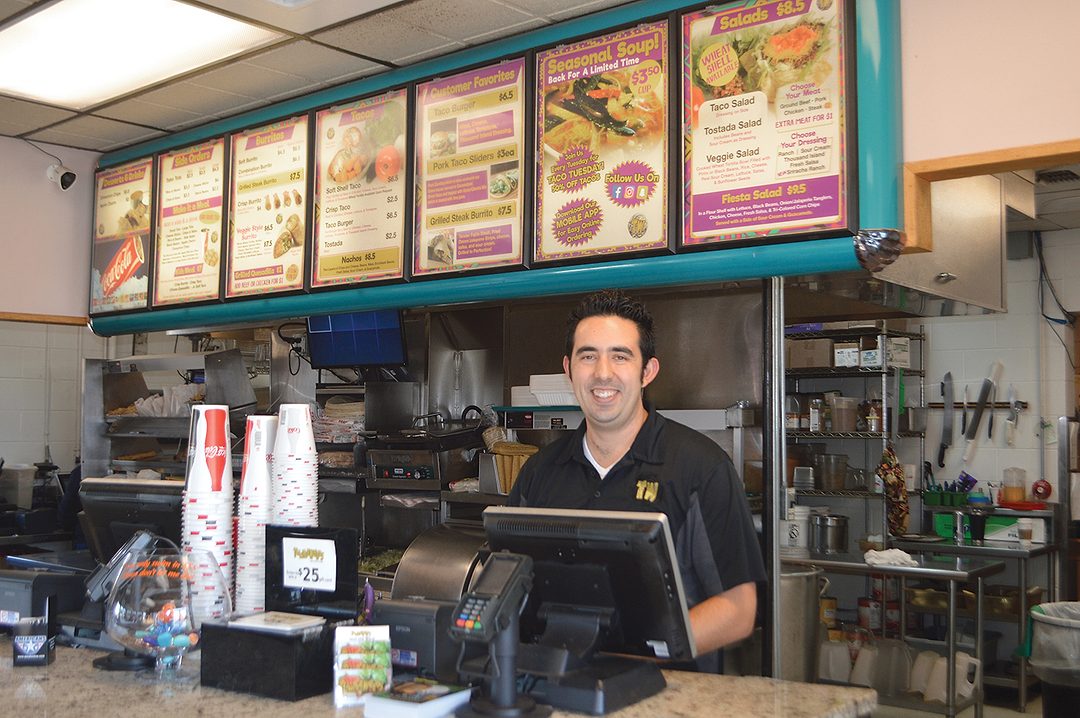
Home » Minimum wage increase likely means higher costs for consumers
Minimum wage increase likely means higher costs for consumers

November 14, 2019
Tri-City fast food restaurant owners say there’s no way to avoid raising prices when the latest minimum wage increases kick in at the start of 2020, requiring workers be paid at least $13.50 an hour.
“Anybody who thinks that prices aren’t going to go up, you’re fooling yourself,” said Tom Tierney, owner of the Tri-Cities’ DQ Grill & Chill restaurants.
After 40 years of restaurant ownership, Tierney said, “You can only absorb so many costs. You can control the cost of food, what we pay for it, and we can control our cost of labor. When either of those goes up precipitously, we can staff less people, but we don’t necessarily want to do that because we’re the service business, so you don’t want to give less service. So ultimately, we’re all going to have to raise prices.”
The owner of Tumbleweeds Mexican Flair in Richland said a 2 percent increase across the board is “almost mandatory.”
“If the average person is buying two to three items, it could be $1 more a visit. For the people who come every day, that’s a concern of mine: Are they going to pay?” asked owner Keith Moon.
A voter-approved initiative in 2016 hoisted the minimum wage from $9.47 an hour to $11 an hour beginning in 2017, and then increasing by 50 cents each year through 2020, when it will jump $1.50 an hour—from $12 an hour to $13.50—on Jan. 1.
Starting in 2021, and every year after, the state Department of Labor and Industries will make a cost of living adjustment based on the federal Consumer Price Index for Urban Wage Earners and Clerical Workers.
It’s likely higher prices could be passed on to customers at other places where workers are paid minimum wage when the new increase takes effect.
The ownership group operating The Bradley in Richland is likely to respond to the minimum wage increase by turning servers at the hip establishment into commissioned staff who will no longer receive tips.
Bradley co-owner Zac Mason said it will amount to a drastic difference in the amount of taxes the restaurant has to pay. “Right now, when a server works, they get whatever the person who comes in feels like tipping,” he said. “We pay taxes on those tips, but we don’t get to keep any of them, which is kind of a strange thing that I think a lot of people may not be aware of. When someone tips their server, we as business owners pay taxes on the tip they left, but it never sits in our account, so it’s just a fun little extra tax we get.”
To help offset the taxes and the latest minimum wage increase, The Bradley is likely to add a 20-percent surcharge to customers’ bills that would cover the tip, as well as the tax and wage increase required for the staff.
Mason said it’s a model used successfully at Seattle’s El Gaucho restaurant, which began adding a service charge in lieu of tipping in 2016.
Mason expects other locally-owned restaurants to break from the traditional tipping model based on the total amount of the bill. He said a handful of restauranteurs are considering forming a Tri-City Restaurant Coalition. Members would use the same agreed-upon surcharge, likely 20 percent, beginning in 2020 to maintain consistency across the community for ease of understanding. “We are working as a group to stay alive in the Tri-Cities,” he said.
The Association of Washington Business, the state’s largest business organization, has opposed the stepped minimum wage increases, calling it a “one-size-fits-all approach to wages.”
“Small businesses and employers in economically-depressed regions of the state may not be able to keep up with the rising labor costs the initiative will impose, creating difficult decisions about both job creation and job retention,” said Gary Chandler, AWB vice president of government affairs, after the 2016 legislative session.
Moon’s concerned about it. “It’s been on our minds ever since that wage law passed, just how’s it going to affect us and how can we prepare for that. This coming year is probably the most substantial since it’s been incremental over the last couple years,” he said.
Moon met with his accountant to quantify the true impact to his Richland restaurant, which has been in Moon’s family for nearly 20 years. He has owned it since 2014. Moon figures he’s paid employees for 11,500 work hours in the last year. Taking the $1.50 an hour difference that will be in effect in 2020, Moon estimated at least $17,000 in additional expenses, if his labor remains the same.
“When I tried to put it into life scenarios, I thought, ‘OK, $17,000 is about $1,400 a month.’ If your house payment went up by $1,400 a month, surely, you would act,” he said. “You would think, ‘How can I deal with this? Do I need to make more? Do I need to cut something?”
Moon hasn’t taken the easy route of passing the cost increases on to customers without first tightening his own belt. He’s started to buy pre-prepped food like diced onions and shredded cheese to reduce labor costs. It costs more, but there is a savings versus paying employees up to four hours a week to dice or shred.
He’s also re-organizing shifts so that Tumbleweeds can get by with one less employee at the start of the work day, saving 30 minutes before the third person on shift clocks in.
Additionally, Moon plans to reduce the overall hours of business to capture their busiest times, no longer staying open after 2 p.m. Saturdays. “Rather than risk the inefficiency of paid labor and hope that customers are coming in at a down time, when they’re just not,” Moon said.
He said Tumbleweeds serves about 150 people on a Saturday versus 2 to 2½ times that on a weekday. Tumbleweeds already cut Sunday hours entirely a few years ago, which Moon said was a great move.
Moon’s nine employees already make more than minimum wage, so he’s still assessing how individual wages will change in accordance with a worker’s experience and tenure.
“It’s an interesting dynamic to have supervisors who are already paid over $13.50 an hour. Are they going to be OK with the other people making close to that, or do they need to be raised at the same level?” Moon said.
Finding and retaining quality workers remains a constant issue, Tierney said.
“The labor force is really thin so everybody is struggling to keep employees. That, by its very nature, increases wages because if you want to keep your employees, you’ve got to raise wages. And you may end up having to pay more to start people, because you’ve got to get better candidates,” Tierney said.
That simple supply and demand for talented staff results in the need for higher pay at a time when restaurants are already operating close to the edge.
“We lost P.F. Chang’s, we lost Famous Dave’s, we lost Dickey’s BBQ, and that’s because margins are so small. There’s less profit at the end of the day because of increased costs and decreased transactions. I’ve been through some tough labor times before in the Tri-Cities, but this is a real challenge,” Tierney said.
Mason said The Bradley operates at a loss every month and thinks the latest wage increase could force the restaurant’s closure. He called The Bradley a “passion project” for its owners. “None of us have made any money off it, and we have continued to strive to keep open because we believe in it,” he said.
Mason said when he crunched the numbers for October, the Richland restaurant operated in the red, but would have been in the black if it had levied a service charge due to the sheer amount of taxes paid.
“We either have to choose to shut our doors in January with the latest hike or find a way to survive. This (service charge) was the viable way to do it,” he said.
Moon finds that when he’s raised prices before, customers tend to buy less, keeping total ticket prices at a plateau.
“What I notice in just general behavior of customers is, ‘I’ve got $10, I’ve got $12, I’m going to go get lunch.’ So they come in here and have intentions of getting a salad, a small tater tot and a drink, and that might be $13, so now they’ll just say, ‘Eh, I’ll just have a salad and a drink.’ I’ve noticed this change in behavior, ‘I can do without,’ “ Moon said.
Raising prices is a necessary in the current climate, Tierney said. “The only reason our ticket average has gone up is because prices have gone up,” he said. “People are just having to pay more. Our industry, and nationwide, we’re all transaction-challenged. We’re seeing less transactions on a daily basis. So while sales are growing because of price increases, really business isn’t growing.”
At Tumbleweeds, Moon knows there’s a cap for prices due to the fact that his restaurant at 894 Stevens Drive offers a drive-thru and counter service. “There’s real value and there’s perceptive value. Someone could look at the menu and say, ‘Man, a taco salad is $8.50. Now $8.65 is not that much different, but, still, that’s a lot for a fast food salad. The same salad at a sit-down restaurant could be $11 or $12, but it’s a little more acceptable. It might be the same freshness, it might be the same product, but we’re limited in the genre of our restaurant. We can’t charge $12 for a drive-thru salad on your 30-minute lunch break,” he said.
Prior to the passage of the 2016 initiative to raise wages statewide, the Puget Sound Business Journal estimated 730,000 people earned minimum wage in the state. Wages are already above state-mandated minimums in Seattle and SeaTac, where workers make at least $16 hourly. Studies from the University of Washington looked at the wage increases’ effect on supermarket food prices and child care costs. The studies found no effect on food prices, but higher tuition and staff hour reductions for child care workers.
Moon expects to raise prices prior to the new year to align with menu changes and updates.
“This place is what provides a living for my family and nine other people in the store. It’s a tremendous responsibility to be at the helm of the decision-making, to know that I have to do this to keep up with the times. I hope the increases will be understood, and in general, I think the Tri-Cities is pretty understanding,” he said.
Previous plans to open a second Tumbleweeds location are no longer being considered, partially due to increased costs such as this.
Mason said his staff at The Bradley appears to understand switching to being commissioned staff is a necessity. “We have a very small staff and most people have been working in the industry for quite a while, and are educated, so they seem to get it. They get that we’re not trying to turn extra profit for ourselves to go buy nice things. It’s literally the difference between, ‘Go find a new job because we won’t be open anymore,’ or we do this,” he said.
Tierney opened his third Richland DQ on Duportail Street nearly two years ago, and is focusing on operating his restaurants across the Tri-Cities, Yakima and Walla Walla efficiently and profitably despite the market shifts. “One way or the other, my job is to try to run restaurants, so we’ve got to figure it out. That’s why I wear the big boy pants,” he said.
(Editor's note: This story has been updated to correct the spelling of Zac Mason's name. 11/16/19)
Local News
KEYWORDS november 2019





